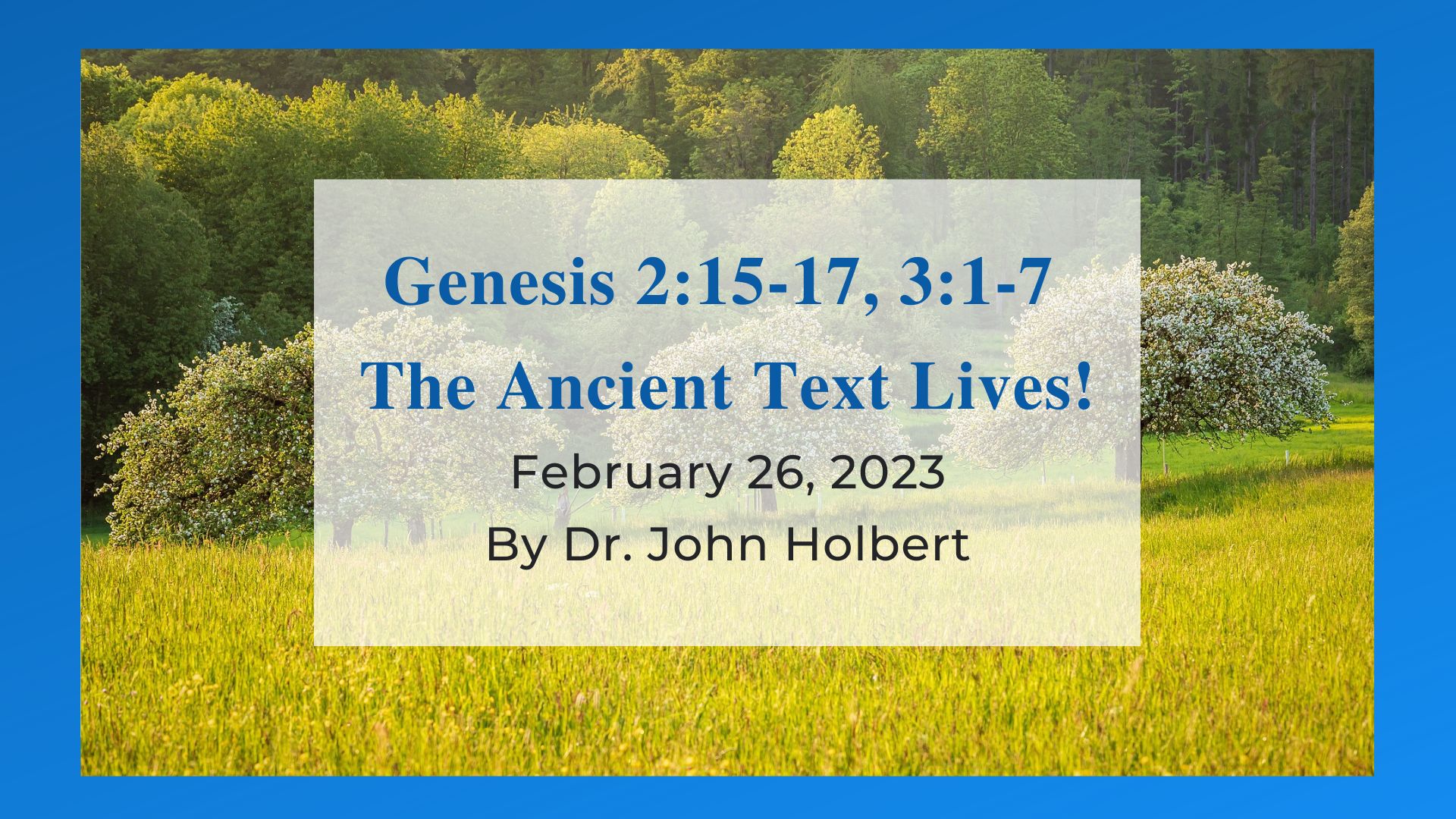The Ancient Text Lives! - Reflections on Genesis 2:15-17, 3:1-7
by Dr. John Holbert on Tuesday, February 21, 2023

The Ancient Text Lives!
Genesis 2:15-17, 3:1-7
The Peripatetic Hebrew Bible Preacher
This grand and rich text is often chosen for the first Sunday in Lent, since it traditionally is seen as a warning to obey the commands of God, and notes further that the refusal to obey leads to disaster. That is a basic claim of the biblical story and is surely not wrong in the simplest sense. Obey and succeed, disobey and fail, is one common way of summarizing a good deal of the biblical message concerning the human relationship to the God. Yet, there is so much more to be addressed in these astonishing verses that one tiny essay can hardly do it any justice.
I propose something different today in my look at the familiar passage. I will newly translate the whole thing with an eye out for a few of the multiple nuances that might be captured in the actual words as I hear them. And along the way of my reading, I will emphasize those places where a preacher might reap a wonderful homiletical harvest.
Gen.2:15-17
15) YHWH Elohim took the earth creature (I call him Dusty, in order to avoid any gender specification, since the Hebrew does not allow that; the usual reading is “Adam” or “the man”), and placed it in Eden’s garden to serve it and guard it (the usual reading of “till” is an antiquated agricultural suggestion from the KJV; the Hebrew is "serve,” plain and simple; the role of Dusty is to serve as a partner in God’s garden and to guard it from all dangers. Environmental implications may readily be seen here by the observant preacher). 16) YHWH Elohim commanded Dusty, “From every tree of the garden you may readily eat, 17) but from the tree of the knowledge of good and bad (one Hebrew way of saying “everything”), from it you must not eat; surely, the day you eat from it you will certainly die.”
The tree is not merely the tree of morality, far less is it a tree that bears some sort of sexual knowledge only. This is the tree of universal knowledge, a tree that offers divine knowledge. Can and should humans have access to such knowledge? What would be the implications of a human endowed with divine knowledge? I am reminded here of the chilling quotation, supposedly uttered by Robert Oppenheimer upon witnessing for the first time the mushroom cloud of an atomic explosion: quoting the Hindu Bhagavad Gita, which he had read in its original Sanskrit, he intoned, “ I am become death, the destroyer of worlds.” Is that one possible result of the human acquisition of divine knowledge?
Gen.3:1-7
1)The snake was more clever than any wild animal that YHWH Elohim had made (the word I read “clever” is the singular form of the word used to describe the physical state of the human beings, created male and female” by YHWH Elohim in Gen.2:25: they were “nude.” To catch the pun, one could translate Gen.3:1 “shrewd”). He (the snake) said to the woman, “Is it so that Elohim said that you must not eat from any tree in the garden?” (This is not true, as she and we know; God said that every tree, save one, was fair game for eating). 2) The woman said to the snake, “From the fruit of the trees of the garden we may eat, 3) but from the fruit of the tree in the middle of the garden, Elohim said that we must not eat from it, nor touch it, lest we die” (a careful preacher will ponder the woman’s addition to the command of God not to touch the tree, thus strengthening that command considerably. But why?). 4) The snake said to the woman, “You will certainly not die! 5) Because Elohim knows that on the very day of your eating from it, your eyes will be opened, and you will be like Elohim (or one could read “precisely Elohim”), knowing everything (the same “good and bad” above). 6) When the woman saw that the tree was ripe for eating, and delightful to the eyes, and that the tree was desirable to make one wise, she took of its fruit and ate, and gave some to her man with her, and he ate. 7) And the eyes of both of them were opened, and they knew they were nude, so they sewed fig leaves and made themselves aprons.
Here are questions one could now raise: If the tree is the tree of universal knowledge, why is the first bit of knowledge the couple possesses is that fact of their nudity? Does that say anything about humans and divine knowledge? The first human action is a furious sewing of fig leaves in the attempt to solve the issue of nakedness, not a problem in Gen. 2:25, but now apparently something that needs a solution. Why do they choose fig leaves? Have you ever felt a fig leaf? Would you have one on for very long if you surrounded your loins with a fig leaf apron? What has the man been doing during the dialogue with the snake that the woman engaged in? Has he been there the entire time? Why does he not say anything, only eat what is given to him by the woman? What might it mean to be like Elohim, or perhaps precisely Elohim? In what ways do you see this text as serious about human behavior after disobeying the command of God? Or perhaps better, how is it seriously funny about that behavior?
This is clearly one of the Bible’s greatest texts. I hope you will find it food for any number of sermons that will help your congregation enter once again into the season of Lent.
